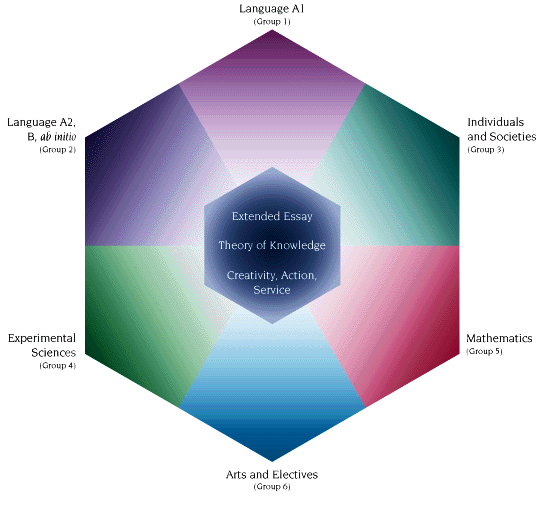|




| |
The International Baccalaureate Diploma
Program is a rigorous course of studies, leading to examinations, designed to
meet the needs of highly motivated and ambitious high school students. Following
a comprehensive two-year curriculum, that allows its graduates to fulfill requirements of
various national education systems, the diploma model is based on the system of no
single nation but incorporates the what we believe are the best elements of
several European systems.
The IB Diploma Program contains several distinctive elements in addition to the
established strengths of a liberal arts curriculum.
 | Theory of Knowledge (TOK)
is a required interdisciplinary course designed to stimulate students to critical reflection upon the knowledge and experience gained
both in academic and social environments. The course challenges its students to question the
bases of knowledge, to be aware of subjective and ideological biases, and to
develop a reflective mode of thought based on critical analysis of evidence expressed
in rational arguments. Considered the central element in the IBO's educational philosophy,
TOK seeks to develop a coherent approach to learning which transcends and unifies
all subjects and encourages student appreciation of different cultural perspectives. |
 | Creativity, Action, (CAS)
is a cornerstone of the IBO's diploma curriculum. The CAS requirement of 150
hours of community service, cements the importance of life outside the world of scholarship, providing a
refreshing balance to the academic self-absorption many students develop within a demanding school program.
Participation in theatre productions, sports and community service activities
encourages students to share their energies and special talents while developing awareness, concern and the
ability to work cooperatively with others. |
 | Extended Essay. All diploma candidates are required to undertake
the writing of an original research essay of 4000 words' length. This project offers
students the opportunity to investigate a topic of particular individual interest
and familiarizes students with the kind of independent research and writing skills expected at university. |
The Grading System
The IBO's grading system is criterion-referenced,
that is to say that each student's performance is measured against defined levels of achievement consistent from one examination session to the
next. Grades reflect the realization of knowledge and skills relative to set standards equally applied to all schools.
The Curriculum
International curriculum planners seek to ensure that the organization's educational
aims are embodied in the structure and content of the program itself. The diploma
is displayed in the shape of a hexagon with six academic areas surrounding the core.
Diploma candidates are required to select one subject from each of the six subject
groups. At least three and not more than four are taken at higher level
(HL, 240 hours), the others at standard level (SL 150 hours).
Distribution requirements ensure that the science-oriented student is challenged to
learn a foreign language and that the natural linguist becomes familiar with laboratory
procedures. While overall balance is maintained, flexibility in choosing higher level
concentrations allows the student to pursue areas of personal interest and to meet
special requirements for university entrance.

- Language A1
Student's first language, including the study of selections from world literature
(works in translation)
- Language A2, B, ab initio
A second modern language.
- Individuals and Societies
History, geography, economics, psychology, social anthropology, business and organization, information
technology in a global society.
- Experimental Sciences
Biology, chemistry, physics, environmental systems, design technology.
- Mathematics
mathematics HL, advanced mathematics SL, mathematical studies,
mathematical methods.
- Arts and Electives
Art/design, music, theatre arts, Latin, classical Greek, computer science, a third modern language, a second subject from group 3 or
group 4, advanced mathematics SL, a school-based syllabus approved by the IBO.
Assessing Student Work
Responsibility for all academic judgments about the quality of candidates' work rests
with more than 3500 examiners worldwide, led by chief examiners with international
authority. A variety of assessment methods are used to value both the content and
the process of academic achievement and to take into account different learning
styles and cultural patterns.
Conventional external examination techniques are chosen from a range of options:
oral and written, long and short responses, data-based questions, essays, multiple
choice questions. These are complemented by internal assessment of coursework by
the teachers responsible for evaluating students over the two-year period.
Award of the Diploma
Each examined subject is graded on a scale of 1 (minimum) to 7 (maximum). The
award of the diploma requires students to score a minimum of 24 points and the satisfactory completion of the
extended essay, TOK and CAS. The maximum score of 45 includes three points for the
combination of the extended essay and work in TOK.
Over 36,000 students annually are assessed by the IBO. Approximately 80% of candidates attempting the diploma
succeed in earning it.
University Recognition
IB graduates gain admission to colleges and universities throughout the
world. Students with strong IB examination results may also receive advanced standing depending upon the policy of the institution they are
attending. In addition, formal agreements exist between the IBO and many ministries
of education.
Links




|
